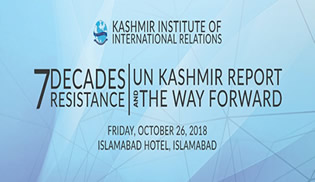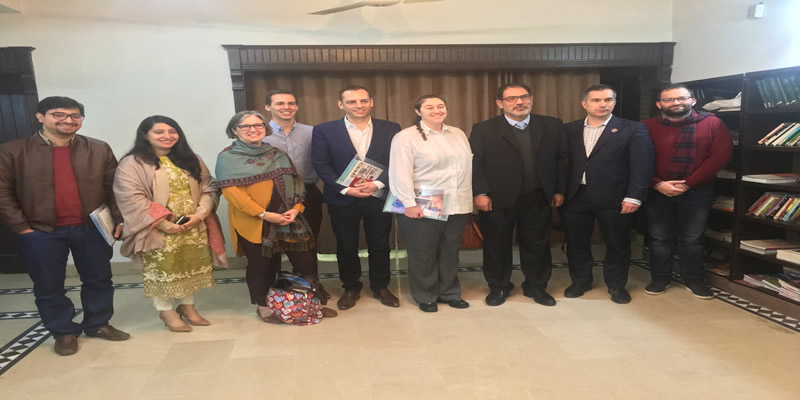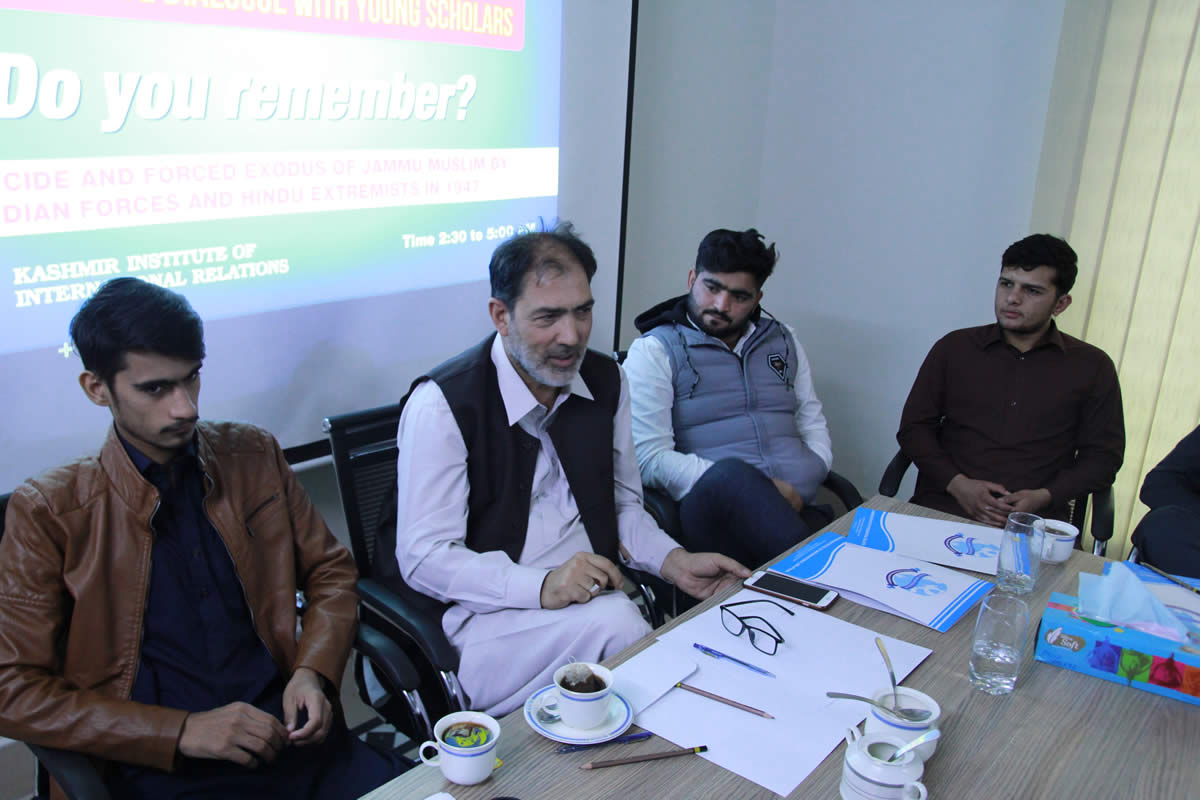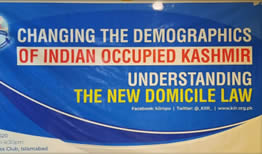Demographic Changes, Violation of International Law
Report
A webinar “Demographic Changes, Violation of International Law: A Case Study of Indian
Occupied Kashmir” was organized by Kashmir Institute of International Relations (KIIR) in the
collaboration of World Muslim Congress (WMC), dated September 28, 2020, constituted of the
profound panelists, i.e, The Hurriat Leader from Indian Occupied Kashmir Moulana Mansoor
Abbas Ansari, Labour MP for Luton North Miss Sarah Owen, Member of Parliament for
Peterborough Paul Baristow , Ms. Shaista Safi, Syed Faiz Naqshbandi (APHC), Executive
Director YFK Ahmad Qureshi.
The webinar was moderated by Altaf Hussain Wani Chairman KIIR. The discussion formulated
in the session was to grab the attention and focus of the international community upon the issue of
Kashmir conflict especially on the unilateral and illegal action of 5th of August 2019 and the new
domicile law enacted by the government of India to enforce the demographic change in occupied
territory. Panelists termed annexation and new domicile law as violation of international law,
Fourth Geneva Conventions and UN security resolutions on Kashmir. The panelists examined and
exposed India’s brutal policies and actions of the government of India to suppress indiginous and
peaceful resistance of people of Indian Occupied Jammu and Kashmir. The panelists have made
their stance that the voices of Kashmiris should be heard louder and clearer. Demographic
alienations, extrajudicial killings, systematic violence against women and children, Abrogation of
atricle 370 and 35A, ethnic cleansing, genocide alert, and a number of issues like these, were
explained skeptically by the panelists. They urged the international community and world leaders
to raise their voice for the voiceless people of Jammu and Kashmir, make India accountable for its
pledges and obligations and pave the way for the implementation of UN resolutions so that people
of Kashmir can decide their political future through their free will.
Paul Baristow: He focused on the elements of national state security. He summoned the
international community to hear the screams and feel the pain of the people of Jammu and Kashmir. He said that these voices should be heard loud and clear. He explained that this Kashmir
dispute is not specifically about the territorial issue between India and Pakistan but it is mainly a
Human rights conflictual region.
Ahmad Qureshi” Ahmad Qureshi highlighted the paradigm shift in international perception of
India. He proposed that there has been a noticeable change in the language of international media
post 2016, aftermath the extrajudicial killing of a Kashmir youth activist Burhan Wani. The year
2016 tremendously showed the world’s open criticism and condemnation regarding India's brutal
acts occurring against the Innocent masses of Kashmir. India is much appreciated and proved as a
role model for the developing states as contemporarily, India has been growing as an economic
and technological hub. We have seen that from the past six to seven decades, India had successfully
kept the International community diverted from the Kashmir issue. But now, Kashmir has become
the centre of attraction in the global eyes. In 2016, for the first time, the United Nations discussed
the Kashmir conflict by recognizing the Indian barbaric policies in Indian occupied Kashmir.
Moreover, he counted a positive side of rising voices of Kashmiris as it is not a taboo anymore to
discuss the humanitarian violation committed by India in Kashmir on an international level. Now
that India has been tremendously exposed, the international community should recognize the brutal
Indian autocratic government and critically condemn and punish them accordingly. In addition to
that, it can be evident that now international media i.e. BBC, CNN, etc and academics are covering
Kashmir conflict more than our national media. Therefore, the shift has been made and should be
acknowledged on all forums. Ahmad Qureshi further said that it's remarkable that now we could
access the latest updates on the Kashmir conflict through international sources just like the Syria
conflict. In Qureshi’s final remarks, he thanked the High Commissioner of UNHRC for
recognizing the obnoxious humanitarian violations via accounting last two reports on Kashmir
conflict in 2018 and 2019 respectively. Now the question here is that could we use this shift for
conflict resolution. How could we nudge India into resolution of the Kashmir conflict. He
explained how this shift could be a challenge for human rights defenders to nudge India into this
issue as India has complex networks in the international community.
Syed Faiz Naqshbandi: Faiz Naqshbandi explained the three dimensions of Kashmir conflict.
The first one he discussed was the political aspect in which he talked about the UN resolutions that
were passed via different conventions and humanitarian laws, granting the rights to the Kashmiris the final disposition. Secondly, he threw light on the aspect of humanitarian rights violation in
Jammu & Kashmir committed by Indian occupation forces. These violations uphold the
demographic changes in the region. The drastic war crimes have occurred in IOK under article 144
and 147 of the UN Geneva Convention. Moreover, he explained how the infinite number of forced
disappearances, extra judicial and custodial killings are increasing in Jammu & Kashmir. He
instigated that the most militarized zone in the world is Indian occupied kashmir. It is a foremost
threat to the climate and international community due to its complexity in the world.
Masoor Ansari: Masoor Ansari commented on India's unilateral action of bifurcating the union
of Jammu and Kashmir. He explained the horrific changing demographics of the region via
demolishing the article 370 and 35 A of Indian constitution and implementing the domicile law in
such a short time span. He illuminated the sad and horrible testimonies of the innocent Kashmiris.
He said that Kashmiris are under a constant threat and fear because indian government is literally
upto exterminating muslims from all over India. He declared these violations as a massacre of
muslims in Jammu and Kashmir and recounted this as the violation of international law. From the
very first day, People of IOK have condemned these Indian policies because they knew the motives
behind these. Basically, Indians have left no stone unturned to turn Kashmiris into minorities in
their own land. After the revocation of Article 370 of Indian Constitution, which absolutely
abrogated the special status granted to Jammu and Kashmir, the new Kashmir domicile law is
evident to be the second attempt by the Indian administration to bring demographic flooding to
IOK. The new kashmiri law is seemed to be lenient for Indians and harsh for the Kashmiris in
many cases, such as those who have resided for a period of 15 years in Indian-occupied Kashmir
or studied for a period of seven years and appeared in Class 10/12 examinations in educational
institutions located in the region are now eligible to become permanent residents. In addition to
this, under this law, the children of central government officials, who served in IOK for at least 10
years, are also eligible for permanent citizenship. Kashmiris are fearing from this demographic
flooding as their land would be soon snatched by the Indians, who aim to settle in IOK
permanently, which would convert the IOK from muslim majority region to muslim minority.
Indeed, Article 370 abrogation, Citizenship Act and now Kashmir domicile law, are acting upon
the extermination of Muslim community in India.
Sarah Owen: Sarah Owen explained the complexities of pursuing journalism in Indian occupied
Kashmir, where the right to freedom, information, speech, movement and opinions have been
abused since decades. She discussed how the so-called Democratic Republic of India has been
acting on the paradigm of limited democracy, where Modi’s government has been implementing
the unscrupulous and immoral restriction policies on journalism. She said that these restrictions on
media and journalism definitely lead to the manipulation of truth and thus use to craft the fabricated
news. Hence, the regulation of negative terms against muslims like Islamophobia has increased
tremendously nowadays. She enacted that whenever a muslim kashmiri tried to write honest and
accurate state of affairs, the Indian government maligned their status and declared them as antinationals. She emphasized the world to take action against India by scrutinizing it’s behaviour.
She proclaimed that this brutal Indian political approach in Indian occupied Kashmir is
significantly designed to change it’s demography. The international community speaks about
international law and human rights violations in indian occupied kashmir but these voices should
be much louder. She vowed to support and stand for the solidarity and human rights of kashmir.
Shaista Safi: Shaista Safi talked about the international jurisdictions and war crimes tribunal that
were made against the crimes of humanitarian violations. She explained how humanitarian
violations in IOK have been engineering the demographic changes in the region. Here, she
mentioned that Modi has borrowed the page of Israel's book and is working on the same obnoxious
agenda of converting the majority of kashmiris into minority. As once, Chakurwardi said, ‘If the
israeli people could do it, we can do it’. She said that India has violated each and every right of
Universal Declaration for Human Rights and International laws for Kashmiris on a daily basis.
Even they have broken their own constitution by revoking article 370 and article 35 A of the Indian
constitution. Moreover, she renounced that India is completely indulged in the etnic cleansing in
the state. She further said that after the new domicile law, which was introduced on March 22,
2020 in Indian occupied kashmir is a blatant move of Indian government, which had enabled every
non kashmiri more powerful than a native kashmiri in IOK. She condemned the sexual objectivity
approach of Indian government officials regarding the Kashmiri white women, referring to the
most googled phrase after August 5, 2019, “How to marry kashmiri women?” In her final remarks,
she added that People do not matter to India, territory does.
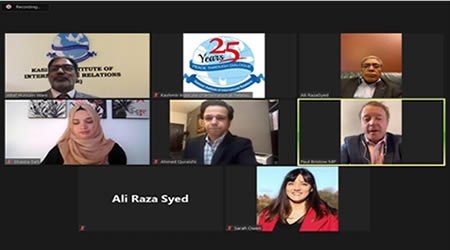
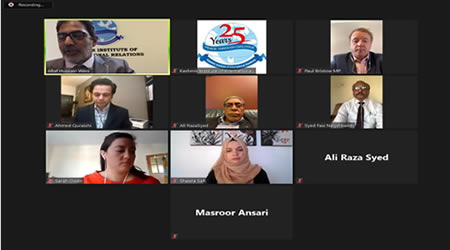
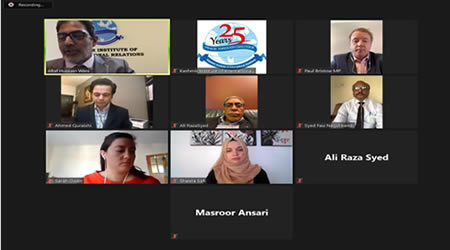
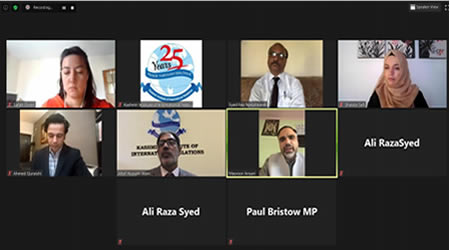
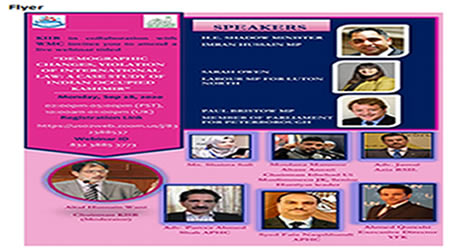
Past Events














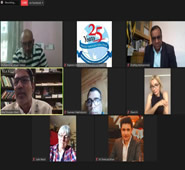
_1627626452.jpg)
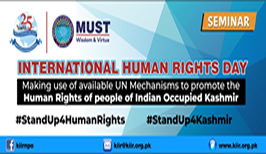
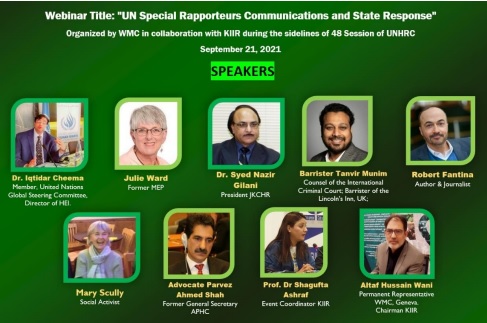
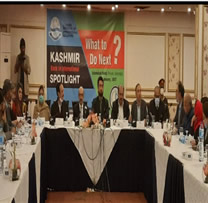
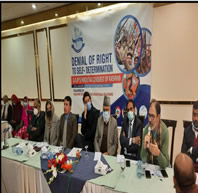
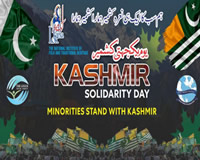
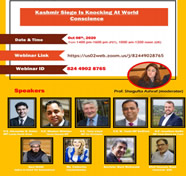
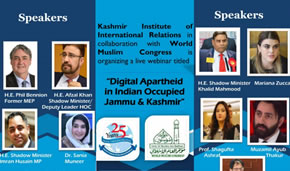
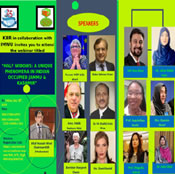
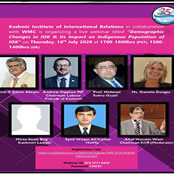
_1627627084.jpg)
